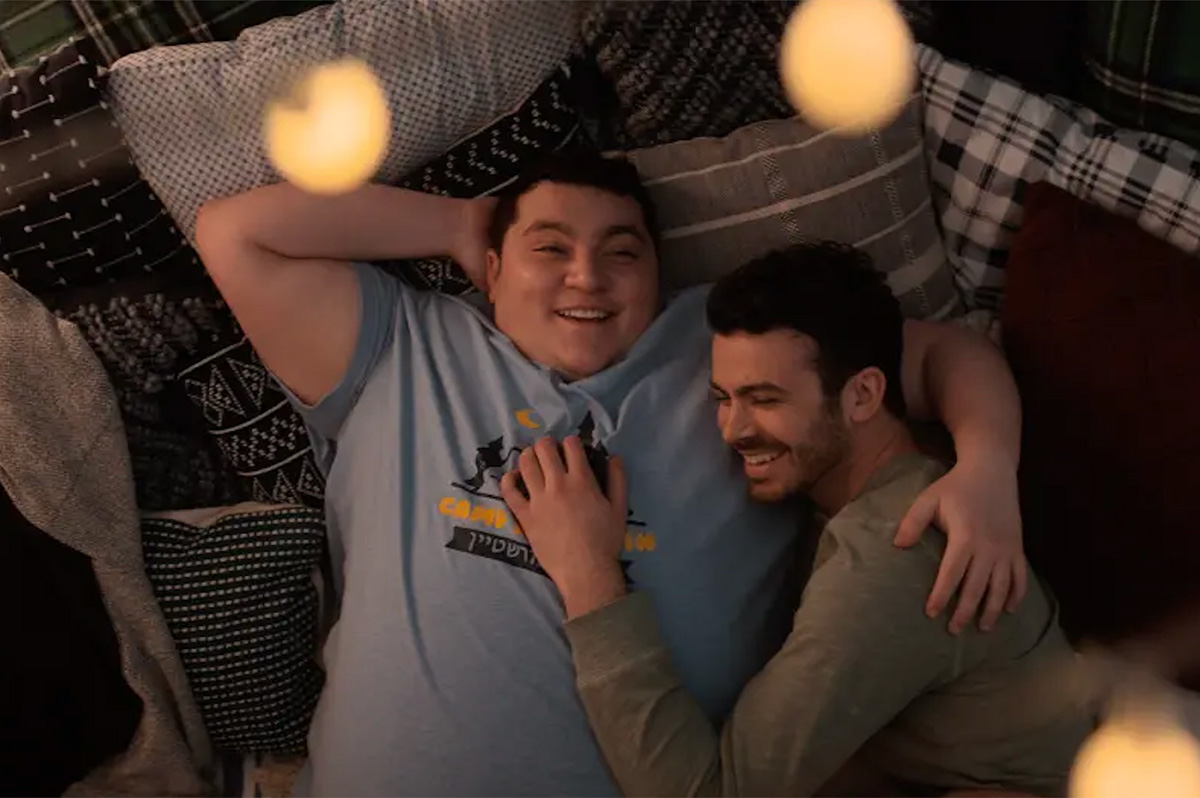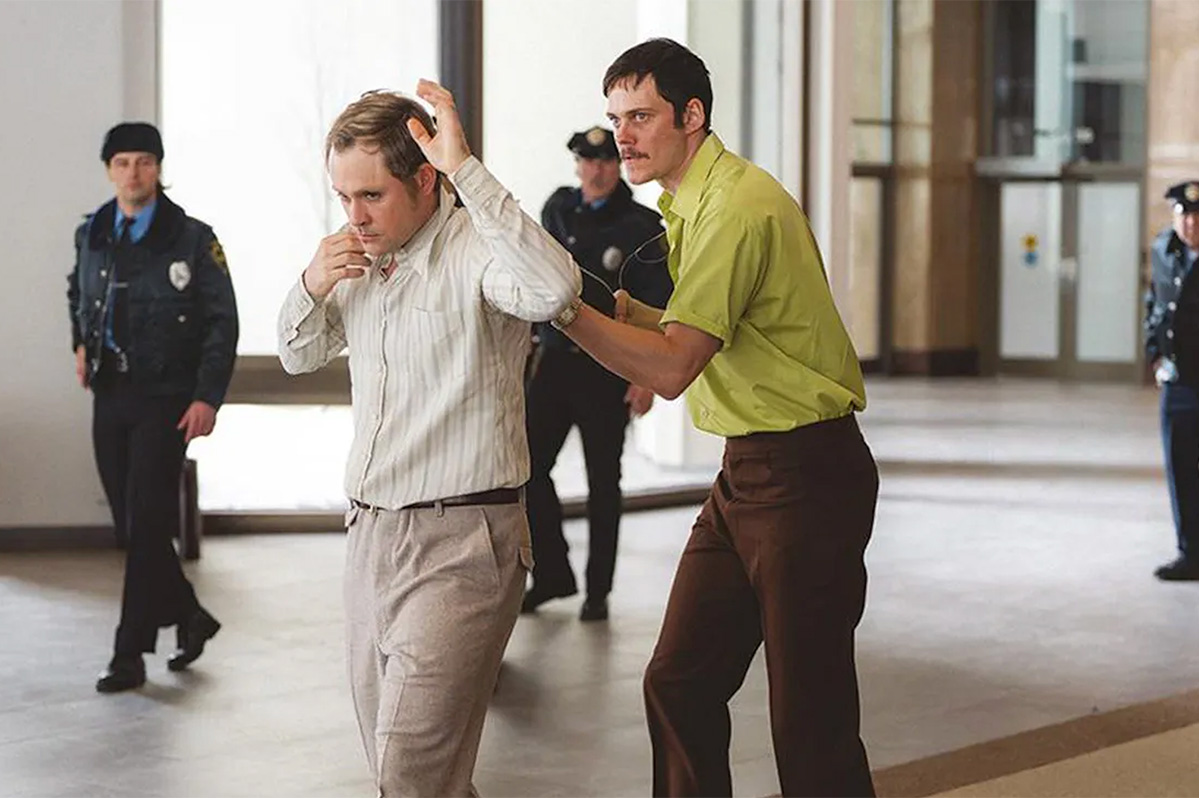Movies
‘Things Like This’ embraces formula and plus-size visibility
Enjoyable queer romcom challenges conventions of the genre

There’s a strange feeling of irony about a spring movie season stacked with queer romcoms – a genre that has felt conspicuously absent on the big screen since the disappointing reception met by the much-hyped “Bros” in 2022 – at a time when pushback against LGBTQ visibility is stronger than it’s been for 40 years.
Sure, part of the reason is the extended timeline required for filmmaking, which tells us, logically, that the numerous queer love stories hitting theaters this year – including the latest, the Manhattan-set indie “Things Like This,” which opened in limited theaters last weekend – began production long before the rapid cultural shift that has taken place in America since a certain convicted fraudster’s return to the White House.
That does not, however, make them any less welcome; on the contrary, they’re a refreshing assertion of queer existence that serves to counter-balance the hateful, politicized rhetoric that continues to bombard our community every day. In fact, the word “refreshing” is an apt description of “Things Like This,” which not only celebrates the validity – and joy – of queer love but does so in a story that disregards “Hollywood” convention in favor of a more authentic form of inclusion than we’re ever likely to see in a mainstream film
Written, starring, and directed by Max Talisman and set against the vibrant backdrop of New York City, it’s the story of two gay men named Zack – Zack #1 (Talisman) is a plus-sized hopeful fantasy author with a plus-sized personality and a promising-but-unpublished first novel, and Zack #2 (Joey Pollari) an aspiring talent agent dead-ended as an assistant to his exploitative “queen-bee” boss (Cara Buono) – who meet at an event and are immediately attracted to each other. Though Zack #2 is resigned to his unsatisfying relationship with longtime partner Eric (Taylor Trensch), he impulsively agrees to a date the following night, beginning an on-again/off-again entanglement that causes both Zacks to re-examine the trajectories of their respective lives – and a lot of other heavy baggage – even as their tentative and unlikely romance feels more and more like the workings of fate.
Like most romcoms, it relies heavily on familiar tropes – adjusted for queerness, of course – and tends to balance its witty banter and starry-eyed sentiment with heart-tugging setbacks and crossed-wire conflicts, just to raise the stakes. The Zacks’ attempts at getting together are a series of “meet-cutes” that could almost be described as fractal, yet each of them seems to go painfully awry – mostly due to the very insecurities and self-doubts which make them perfect for each other. The main obstacle to their couplehood, however, doesn’t spring from these mishaps; it’s their own struggles with self-worth that stand in the way, somehow making theirs more of a quintessentially queer love story than the fact that both of them are men.
All that introspection – relatable as it may be – can be a downer without active energy to stir things up, but fortunately for “Things Like This,” there are the inevitable BFFs and extended circle of friends and family that can help to get the fun back on track. Each Zack has his own support team backing him up, from a feisty “work wife” (Jackie Cruz, “Orange is the New Black”) to a straight best friend (Charlie Tahan, “Ozark”) to a wise and loving grandma (veteran scene-stealer Barbara Barrie, “Breaking Away” and countless vintage TV shows) – that fuels the story throughout, providing the necessary catalysts to prod its two neurotic protagonists into taking action when they can’t quite get there themselves.
To be sure, Talisman’s movie – his feature film debut as a writer and director – doesn’t escape the usual pitfalls of the romcom genre. There’s an overall sense of “wish fulfillment fantasy” that makes some of its biggest moments seem a bit too good to be true, and there are probably two or three complications too many as it approaches its presumed happy ending; in addition, while it helps to drive the inner conflict for Zack #2’s character arc, throwing a homophobic and unsupportive dad (Eric Roberts) into the mix feels a bit tired, though it’s hard to deny that such family relationships continue to create dysfunction for queer people no matter how many times they’re called out in the movies – which means that it’s still necessary, regrettably, to include them in our stories.
And in truth, “calling out” toxic tropes – the ones that reflect society’s negative assumptions and perpetuate them through imitation – is part of Talisman’s agenda in “Things Like This,” which devotes its very first scene to shutting down any objections from “fat shamers” who might decry the movie’s “opposites attract” scenario as unbelievable. Indeed, he has revealed in interviews that he developed the movie for himself because of the scarcity of meaningful roles for plus-sized actors, and his desire to erase such conventional prejudices extends in every direction within his big-hearted final product.
Even so, there’s no chip-on-the-shoulder attitude to sour the movie’s spirit; what helps us get over its sometimes excessive flourishes of idealized positivity is that it’s genuinely funny. The dialogue is loaded with zingers that keep the mood light, and even the tensest scenes are laced with humor, none of which feels forced. For this, kudos go to Talisman’s screenplay, of course, but also to the acting – including his own. He’s eminently likable onscreen, with wisecracks that land every time and an underlying good cheer that makes his appeal even more visible; crucially, his chemistry with Pollari – who also manages to maintain a lightness of being at his core no matter how far his Zack descends into uncertainty – isn’t just convincing; it’s enviable.
Cruz is the movie’s “ace in the hole” MVP as Zack #2’s under-appreciated but fiercely loyal bestie, and Buono’s hilariously icy turn as his “boss from hell” makes for some of the film’s most memorable scenes. Likewise, Tahan, along with Margaret Berkowitz and Danny Chavarriaga, flesh out Zack #1’s friend group with a real sense of camaraderie that should be recognizable to anyone who’s ever been part of an eclectic crew of misfits. Trensch’s comedic “ickiness” as Zack #2’s soon-to-be-ex makes his scenes a standout; and besides bigger-name “ringers” Roberts and Barrie (whose single scene is the emotional climax of the movie), there’s also a spotlight-grabbing turn by Diane Salinger (iconic as Francophile dreamer Simone in “Pee-Wee’s Big Adventure”) as the owner of a queer bar where the Zacks go on one of their dates.
With all that enthusiasm and a momentum driven by a sense of DIY empowerment, it’s hard to be anything but appreciative of “Things Like This,” no matter how much some of us might cringe at its more unbelievable romcom devices. After all, it’s as much a “feel-good” movie as it is a love story, and the fact that we actually do feel good when the final credits role is more than enough to earn it our hearty recommendation.
Movies
Van Sant returns with gripping ‘Dead Man’s Wire’
Revisiting 63-hour hostage crisis that pits ethics vs. corporate profits

In 1976, a movie called “Network” electrified American moviegoers with a story in which a respected news anchor goes on the air and exhorts his viewers to go to their windows and yell, “I’m mad as hell, and I’m not going to take this anymore!”
It’s still an iconic line, and it briefly became a familiar catch phrase in the mid-’70s lexicon of pop culture, the perfect mantra for a country worn out and jaded by a decade of civil unrest, government corruption, and the increasingly powerful corporations that were gradually extending their influence into nearly all aspects of American life. Indeed, the movie itself is an expression of that same frustration, a satire in which a man’s on-the-air mental health crisis is exploited by his corporate employers for the sake of his skyrocketing ratings – and spawns a wave of “reality” programming that sensationalizes outrage, politics, and even violence to turn it into popular entertainment for the masses. Sound familiar?
It felt like an exaggeration at the time, an absurd scenario satirizing the “anything-for-ratings” mentality that had become a talking point in the public conversation. Decades later, it’s recognized as a savvy premonition of things to come.
This, of course, is not a review of “Network.” Rather, it’s a review of the latest movie by “new queer cinema” pioneer Gus Van Sant (his first since 2018), which is a fictionalized account of a real-life on-the-air incident that happened only a few months after “Network” prompted national debate about the media’s responsibility in choosing what it should and should not broadcast – and the fact that it strikes a resonant chord for us in 2026 makes it clear that debate is as relevant as ever.
“Dead Man’s Wire” follows the events of a 63-hour hostage situation in Indianapolis that begins when Tony Kiritsis (Bill Skarsgård) shows up for an early morning appointment at the office of a mortgage company to which he is under crippling debt. Ushered into a private office for a one-on-one meeting with Dick Hall (Dacre Montgomery), son of the brokerage’s wealthy owner, he kidnaps the surprised executive at gunpoint and rigs him with a “dead man’s wire” – a device that secures a shotgun against a captive’s head that is triggered to discharge with any attempt at escape – before calling the police himself to issue demands for the release of his hostage, which include immunity for his actions, forgiveness of his debt, reimbursement for money he claims was swindled from him by the company, and an apology.
The crisis becomes a public spectacle when Kiritsis subjects his prisoner to a harrowing trip through the streets back to his apartment, which he claims is wired with explosives. As the hours tick by, the neighborhood surrounding his building becomes a media circus. Realizing that law enforcement officials are only pretending to negotiate while they make plans to take him down, he enlists the aid of a popular local radio DJ Fred Heckman (Colman Domingo) to turn the situation into a platform for airing his grievances – and for calling out the predatory financial practices that drove him to this desperate situation in the first place.
We won’t tell you how it plays out, for the sake of avoiding spoilers, even though it’s all a matter of public record. Suffice to say that the crisis reaches a volatile climax in a live broadcast that’s literally one wrong move away from putting an explosion of unpredictable real-life violence in front of millions of TV viewers.
In 1977, the Kiritsis incident certainly contributed to ongoing concerns about violence on television, but there was another aspect of the case that grabbed public attention: Kiritsis himself. Described by those who knew him as “helpful,” “kind,” and a “hard worker,” he was hardly the image of a hardened criminal, and many Americans – who shared his anger and desperation over the opportunistic greed of a finance industry they believed was playing them for profit – could sympathize with his motives. Inevitably, he became something of a populist hero – or anti-hero, at least – for standing up to a stacked system, an underdog who spoke things many of them felt and took actions many of them wished they could take, too.
That’s the thing that makes this true-life crime adventure uniquely suited to the talents of Van Sant, a veteran indie auteur whose films have always specialized in humanizing “outsider” characters, usually pushed to the fringes of society by circumstances only partly under their own control, and often driven to desperate acts in pursuit of an unattainable dream. Tony Kiritsis, a not-so-regular “Joe” whose fumbling efforts toward financial security have been turned against him and seeks only recompense for his losses, fits that profile to a tee, and the filmmaker gives us a version of him (aided by Skarsgård’s masterfully modulated performance) that leaves little doubt that he – from a certain point of view, at least – is the story’s unequivocal protagonist, no matter how “lawless” his actions might be.
It helps that the film gives us much more exposure to Kiritsis’ personality than could be seen merely during the historic live broadcast that made him infamous, spending much of the movie focused on his interactions with Hall (performed with equally well-managed nuance by Montgomery) during the two days spent in the apartment, as well as his dealings with DJ Heckman (rendered with savvy and close-to-the-chest cageyness by Domingo); for balance, we also get fly-on-the-wall access to the interplay outside between law enforcement officials (including Cary Elwes’ blue collar neighborhood cop) as they try to navigate a potentially deadly situation, and to the jockeying of an ambitious rookie street reporter (Myha’la) with the rest of the press for “scoops” with each new development.
But perhaps the interaction that finally sways us in Kiritsis’s favor takes place via phone with his captive’s mortgage tycoon father (Al Pacino, evoking every unscrupulous, amoral mob boss he’s ever played), who is willing to sacrifice his own son’s life rather than negotiate a deal. It’s a nugget of revealed avarice that was absent in the “official” coverage of the ordeal, which largely framed Kiritsis as mentally unstable and therefore implied a lack of credibility to his accusations against Meridian Mortgage. It’s also a moment that hits hard in an era when the selfishness of wealthy men feels like a particularly sore spot for so many underdogs.
That’s not to say there’s an overriding political agenda to “Dead Man’s Wire,” though Van Sant’s character-driven emphasis helps make it into something more than just another tension-fueled crime story; it also works to raise the stakes by populating the story with real people instead of predictable tropes, which, coupled with cinematographer Arnaud Potier’s studied emulation of gritty ‘70s cinema and the director’s knack for inventive visual storytelling, results in a solid, intelligent, and darkly humorous thriller – and if it reconnects us to the “mad-as-hell” outrage of the “Network” era, so much the better.
After all, if the last 50 years have taught us anything about the battle between ethics and profit, it’s that profit usually wins.
Movies
A ‘Battle’ we can’t avoid
Critical darling is part action thriller, part political allegory, part satire

When Paul Thomas Anderson’s “One Battle After Another” debuted on American movie screens last September, it had a lot of things going for it: an acclaimed Hollywood auteur working with a cast that included three Oscar-winning actors, on an ambitious blockbuster with his biggest budget to date, and a $70 million advertising campaign to draw in the crowds. It was even released in IMAX.
It was still a box office disappointment, failing to achieve its “break-even” threshold before making the jump from big screen to small via VOD rentals and streaming on HBO Max. Whatever the reason – an ambivalence toward its stars, a lack of clarity around what it was about, divisive pushback from both progressive and conservative camps over perceived messaging, or a general sense of fatigue over real-world events that had pushed potential moviegoers to their saturation point for politically charged material – audiences failed to show up for it.
The story did not end there, of course; most critics, unconcerned with box office receipts, embraced Anderson’s grand-scale opus, and it’s now a top contender in this year’s awards race, already securing top prizes at the Golden Globe and Critics’ Choice Awards, nominated for a record number of SAG’s Actor Awards, and almost certain to be a front runner in multiple categories at the Academy Awards on March 15.
For cinema buffs who care about such things, that means the time has come: get over all those misgivings and hesitations, whatever reasons might be behind them, and see for yourself why it’s at the top of so many “Best Of” lists.
Adapted by Anderson from the 1990 Thomas Pynchon novel “Vineland,” “One Battle” is part action thriller, part political allegory, part jet-black satire, and – as the first feature film shot primarily in the “VistaVision” format since the early 1960s – all gloriously cinematic. It unspools a near-mythic saga of oppression, resistance, and family bonds, set in an authoritarian America of unspecified date, in which a former revolutionary (Leonardo DiCaprio) is attempting to raise his teenage daughter (Chase Infiniti) under the radar after her mother (Teyana Taylor) betrayed the movement and fled the country. Now living under a fake identity and consumed by paranoia and a weed habit, he has grown soft and unprepared when a corrupt military officer (Sean Penn) – who may be his daughter’s real biological father – tracks them down and apprehends her. Determined to rescue her, he reconnects with his old revolutionary network and enlists the aid of her karate teacher (Benicio Del Toro), embarking on a desperate rescue mission while her captor plots to erase all traces of his former “indiscretion” with her mother.
It’s a plot straight out of a mainstream action melodrama, top-heavy with opportunities for old-school action, sensationalistic violence, and epic car chases (all of which it delivers), but in the hands of Anderson – whose sensibilities always strike a provocative balance between introspection, nostalgia, and a sense of apt-but-irreverent destiny – it becomes much more intriguing than the generic tropes with which he invokes to cover his own absurdist leanings.
Indeed, it’s that absurdity which infuses “One Battle” with a bemusedly observational tone and emerges to distinguish it from the “action movie” format it uses to relay its narrative. From DiCaprio (whose performance highlights his subtle comedic gifts as much as his “serious” acting chops) as a bathrobe-clad underdog hero with shades of The Dude from the Coen Brothers’ “The Big Liebowski,” to the uncomfortably hilarious creepy secret society of financially elite white supremacists that lurks in the margins of the action, Anderson gives us plenty of satirical fodder to chuckle about, even if we cringe as we do it; like that masterpiece of too-close-to-home political comedy, Stanley Kubrick’s 1964 nuclear holocaust farce “Dr. Strangelove,” it offers us ridiculousness and buffoonery which rings so perfectly true in a terrifying reality that we can’t really laugh at it.
That, perhaps, is why Anderson’s film has had a hard time drawing viewers; though it’s based on a book from nearly four decades ago and it was conceived, written, and created well before our current political reality, the world it creates hits a little too close to home. It imagines a roughly contemporary America ruled by a draconian regime, where immigration enforcement, police, and the military all seem wrapped into one oppressive force, and where unapologetic racism dictates an entire ideology that works in the shadows to impose its twisted values on the world. When it was conceived and written, it must have felt like an exaggeration; now, watching the final product in 2026, it feels almost like an inevitability. Let’s face it, none of us wants to accept the reality of fascism imposing itself on our daily lives; a movie that forces us to confront it is, unfortunately, bound to feel like a downer. We get enough “doomscrolling” on social media; we can’t be faulted for not wanting more of it when we sit down to watch a movie.
In truth, however, “One Battle” is anything but a downer. Full of comedic flourish, it maintains a rigorous distance that makes it impossible to make snap judgments about its characters, and that makes all the difference – especially with characters like DiCaprio’s protective dad, whose behavior sometimes feels toxic from a certain point of view. And though it’s a movie which has no qualms about showing us terrifying things we would rather not see, it somehow comes off better in the end than it might have done by making everything feel safe.
“Safe” is something we are never allowed to feel in Anderson’s outlandish action adventure, even at an intellectual level; even if we can laugh at some of its over-the-top flourishes or find emotional (or ideological) satisfaction in the way things ultimately play out, we can’t walk away from it without feeling the dread that comes from recognizing the ugly truths behind its satirical absurdities. In the end, it’s all too real, too familiar, too dire for us not to be unsettled. After all, it’s only a movie, but the things it shows us are not far removed from the world outside our doors. Indeed, they’re getting closer every day.
Visually masterful, superbly performed, and flawlessly delivered by a cinematic master, it’s a movie that, like it or not, confronts us with the discomforting reality we face, and there’s nobody to save it from us but ourselves.
Movies
Few openly queer nominees land Oscar nominations
‘Sinners’ and ‘One Battle After Another’ lead the pack

This year’s Oscar nominees feature very few openly queer actors or creatives, with “KPop Demon Hunters,” “Come See Me in the Good Light,” and “Elio” bringing some much-needed representation to the field.
“KPop Demon Hunters,” which quickly became a worldwide sensation after releasing on Netflix last June, was nominated for best animated feature film and best original song for “Golden,” the chart-topping hit co-written by openly queer songwriter Mark Sonnenblick. “Come See Me in the Good Light,” a film following the late Andrea Gibson and their wife, Megan Falley, was nominated in the best documentary feature category. Finally, Pixar’s “Elio” (co-directed by openly queer filmmaker Adrian Molina) was nominated for best animated feature film alongside “Zootopia 2,” “Arco,” and “Little Amélie or the Character of Rain.”
Ethan Hawke did manage to land a best actor nomination for his work in Richard Linklater’s “Blue Moon,” a biopic that follows a fatal night in Lorenz Hart’s life as he reckons with losing his creative partner, Richard Rodgers. Robert Kaplow was also nominated for best original screenplay for penning the script. Amy Madigan, as expected, was recognized in the best supporting actress category for her work in “Weapons,” bringing celebrated gay icon Aunt Gladys to the Oscar stage.
While “Wicked: For Good” was significantly underperforming throughout the season, with Cynthia Erivo missing key nominations and the film falling squarely out of the best picture race early on, most pundits expected the film to still receive some recognition in craft categories. But in perhaps the biggest shock of Oscar nomination morning, “For Good” received zero nominations — not even for costume design or production design, the two categories in which the first film won just last year. Clearly, there was “Wicked” fatigue across the board.
There was also reasonable hope that Eva Victor’s acclaimed directorial debut, “Sorry, Baby,” would land a best original screenplay nod, especially after Julia Roberts shouted out Victor during the recent Golden Globes (which aired the day before Oscar voting started). A24, the studio that distributed “Sorry, Baby” in the U.S., clearly prioritized campaigns for “Marty Supreme” (to much success) and Rose Byrne in “If I Had Legs I’d Kick You,” leaving “Sorry, Baby” the indie darling that couldn’t quite crack the Oscar race.
However, with the Film Independent Spirit Awards taking place on Feb. 15, queer films like “Sorry, Baby,” “Peter Hujar’s Day,” and “Twinless” will finally get their time to shine. Maybe these films were just underseen, or not given a big enough PR push, but regardless, it’s unfortunate that the Academy couldn’t make room for just one of these when “Emilia Pérez” managed 13 nominations last year.




















